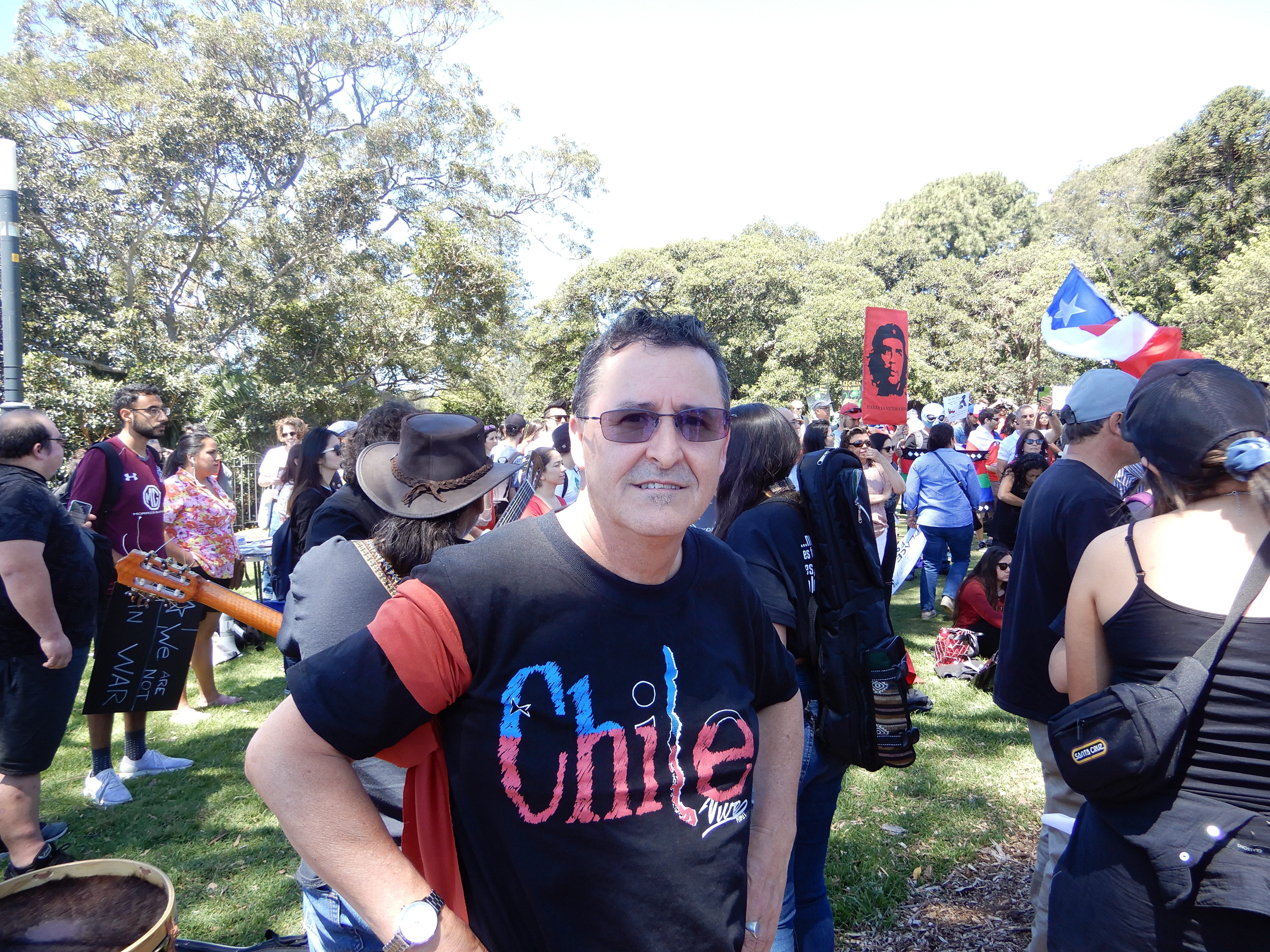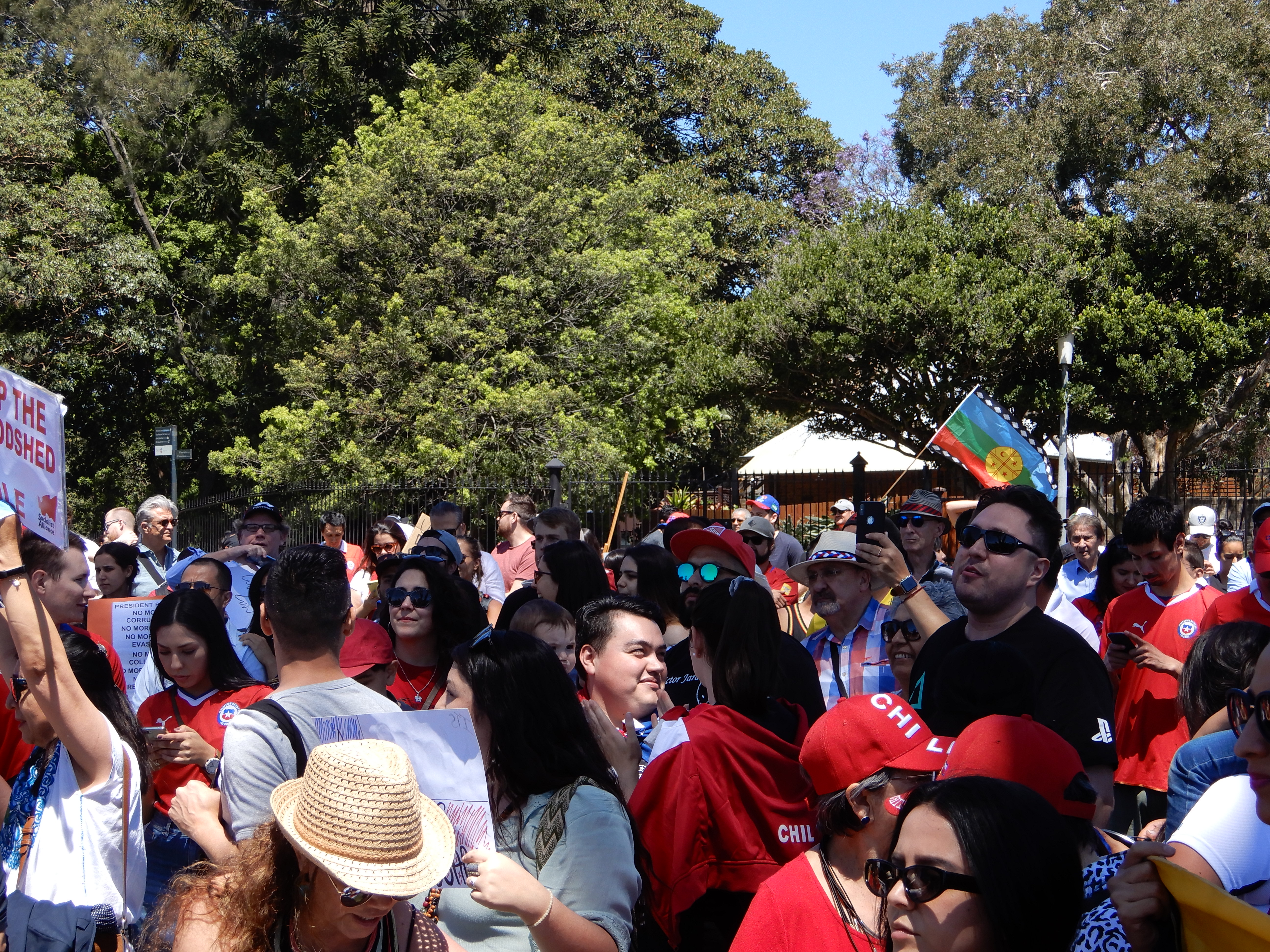Over a million people took to the streets in downtown Santiago on 25 October, bringing a halt to major parts of the city to demand that the reactionary Piñera government bring about structural reforms in a South American nation known for its wealth, but also its social inequality.
As night fell, and many left the rally to return home before an emergency curfew kicked in, the scene turned violent. Authorities began using teargas and water cannons upon demonstrators. Indeed, president Sebastián Piñera had already declared he was at war with his people.
This mass demonstration followed weeks of protests that began with high school student-led metro station protests over an increase in public transport fares. But, following the scrapping of the price hike, the rallies continued as the makeup and demands of participants had broadened.
As unionists, tertiary students and a large number of the working class joined the movement – citing long standing grievances – a state of emergency was called on 18 October, and an agitprop campaign framed those involved in the unrest as arsonists and looters.
Free market repressions
Yet, last Friday's turnout of more than 5 percent of the Chilean population meant that classing the movement as some kind of criminal operation could no longer hold. And what's been brought to the fore is that large numbers of the population aren't stopping until they see substantial change.
Reports on the ground now suggest the involvement of the military and police in coordinated vandalism. And while reports differ, it's likely that government forces have killed dozens of people, arrested around 7,000, and it's also been said that over 100 have been disappeared.
Chile is often hailed as a South American economic miracle. But, while the 1 percent may be benefiting from its neoliberal market, reports have found that 50 percent of Chilean workers are on extremely low wages. So, a 4 percent public transport price hike would be felt.
The Piñera government only came to office in March last year. However, right-wing leader Sebastián Piñera has held the position of president before, over a four year period ending in 2014. And on Monday, as a further concession to demonstrators, he sacked eight of his cabinet ministers.
Suena y seras libre en espiritu
Of course, this is not the first time such a crackdown has occurred in Chile. The first September 11 took place in 1973, when the Allende government was overthrown by a military coup backed by the Nixon administration, which led to years of rule under the repressive Augusto Pinochet dictatorship.
On Sunday, two thousand people rallied in support of the Chilean protesters near the Sydney Opera House. Many in the crowd were old enough to remember the hardships of the Pinochet era.
Sydney Criminal Lawyers spoke to Chileans United-Chilenos Unidos spokesperson Patrick Vasquez about the grievances of protesters, whether the current unrest in Chile is linked to its repressive past, and how the demonstrations will not be coming to a halt until demands are met.

Firstly, over one million Chileans marched through the streets of Santiago last Friday. They were demonstrating against the Piñera government. Mr Vasquez, why are the Chilean people rising up across the country right now?
It's been a build-up of many issues that are impacting on working class Chileans. We're talking here about an expensive education system, a poor health system, a system of age pension that leaves most of the aged Chilean population living in extreme poverty.
In fact, the suicide rate amongst the elderly in Chile is very high. That's basically for two reasons. One is they can't make ends meet. And secondly, they don't want to put an additional burden on their children, who have their own families.
Wages are very low. They haven't increased for a long time. Piñera has just come out last week to say that the minimum wage will increase.
But, it's too little too late, because we now know that over 40 people have been killed since the uprising began two weeks ago.
This means that we have considerable human rights issues across the country. And everything stems from Piñera ordering the military onto the streets and giving them – and the police – the freedom to shoot to kill, to torture and detain.
We've also got dozens of people whose families don't know where they are. It's possible that we are going to have "disappeared" again, which we haven't had since the dictatorship.
Last Friday's march followed weeks of demonstrations that were sparked by a 4 percent rise in subway fares. The government abolished that proposal and made further concessions, but the protests continue. What are the demands of the Chilean protesters?
Secondary students taking over the metro stations was the spark that ignited what had been boiling up for many years.
The reason why Chileans are in the street day after day since then, is that they want answers to issues, such as a constitution that was developed by the military regime of Pinochet.
We want a wage system that increases with inflation. We want the elderly to have a pension system that doesn't condemn them to poverty. We also want better and more accessible education – particularly in tertiary studies – for the young people of Chile.
The health system is also crippled. It's very expensive. People are dying left, right and centre waiting for operations or procedures. Basically, the system cannot cope.

Thousands of protesters have been arrested. Dozens have been killed and reportedly over 100 people have been disappeared. How would you describe the show of force that the government's military is taking upon its civilian population?
I and many others consider that this is taking us back to the military oppression during the dictatorship of Pinochet. We have serious concerns about human rights violations taking place at this very moment in Chile.
We call on the Australian government to intervene and to put pressure on the Chilean government to get the military off the streets, to stop the oppression, to allow people to peacefully protest, and to hear what they are asking for.
At the moment, they're not coming to the negotiating table. They are just coming out and severely repressing the population. They are killing people. People are disappearing. There are curfews.
Human rights are not being adhered to in our country at the moment.
An account by a protester in Santiago suggests that the protesters are being purposely framed as criminals, and the government is somehow complicit in the escalation of the unrest. What's your opinion on those assertions?
Not that the Chilean media shows this, but we have clear evidence that in many cases, the looting and the setting of public buildings on fire has been done by military personnel or the police.
That shows that they're creating turmoil to justify the oppression of the Chilean people and bring the military onto the streets. If that was not happening, then there wouldn't be an excuse to do that.
In many cases, those incidents that have taken place – the burning of buildings, etc – have been done by people who have been ordered by the Piñera government to go out there and do that to justify what's happening at the moment with the oppression and the human rights violations.
You've already touched on this, but it's been 46 years since the Allende government was overthrown in a bloody US-backed coup in 1973. This saw Chile under the autocratic rule of Pinochet until 1990. Are the events of today linked to those times?
They are linked to those times, because Chilean people lived under the oppression of a military regime. The build-up of fear and not being able to speak out came from those times.
During the last 30 years, we've had a supposedly democratic government that's done everything in their power to benefit the super-rich and the multinationals. And this has meant that working class Chileans have been left behind.
Finally, they've now found their voice. And as we say, despertado – the Chilean people have woken up. They will continue the campaign until there is some significant change in Chile for the majority of Chileans.

So, what about the eight ministers that Piñera has just replaced, will that bring an end to the protests?
No. I don't think it will. That's just a band aid that Piñera has put in place, because he wants to be seen as replacing people who should have done something about what's happening.
We consider the Piñera government to be one government that should be in touch and should be fully aware of what's happening in their country, and what is happening to their people.
Now that this has happened, they come out with band aid measures that are not OK. The people want significant political and economic readjustment in our country, so the working class has better living conditions.
We also now need to address the recent human rights violations and the killings.
So, there are pretty broad matters that need to be addressed and that's why across the country in Chile – and in many other places across the world – the Chilean people will continue to campaign until we see significant change, including a new constitution.
And lastly, Mr Vasquez, how do local Chileans supporting the protesters want the Australian government to respond to the unrest that's taking place back in their homeland?
The Australian government needs to put pressure on the Chilean government to get the military off the street to stop the killings, and come to the negotiating table with the relevant organisations – the unions, political parties of the centre and the left – and speak to them, negotiate and find a way to take action on the demands of the people.
Otherwise, this is going to continue. We want real change.
The content of this article is intended to provide a general guide to the subject matter. Specialist advice should be sought about your specific circumstances.

